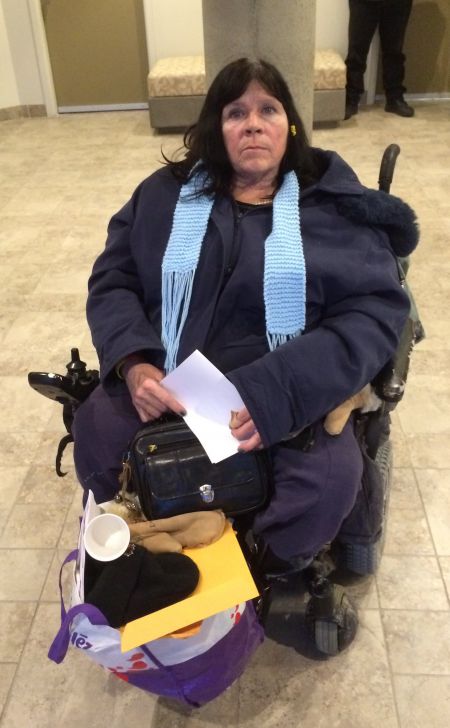On a night on which the windchill will push below -40 C, members and supporters of the Sudbury Coalition Against Poverty (S-CAP) demanded immediate, practical answers from the City of Greater Sudbury's Community Services Committee to the problem of homeless people dying on Sudbury's streets. The city currently lacks a full-winter, out-of-the-cold shelter. Despite sympathetic words from many of the city councillors in attendance, S-CAP left with little other than more questions.
S-CAP hoped that Sudbury might follow in the footsteps of the success by the Ontario Coalition Against Poverty (OCAP) in pushing the City of Toronto to use space in its city hall as a warming centre. However, even investigating that possibility was not included in the directive to staff that was ultimately passed by the committee.
Dianne-Sara Poulin spoke briefly as part of the deputation. "I've been homeless," she said. "I had to sleep in hallways, in rooming houses. So I can understand what [homeless people] are going through." She herself has been housed for many years, and she has made it a regular practice to take homeless people -- strangers -- in. "I have homeless people sleeping on my floor," she told the councillors. She thought that tonight it would probably be five people, but it varies from night to night.
According to S-CAP's Anna Harbulik, this is one of the ways that people are coping despite inadequate services: "Other people living in poverty are stepping in to try to meet the needs of homeless people, given that the city is not meeting its responsibility to the homeless. ... The City has downloaded dealing with helping the homeless onto other people living in poverty."
Sudbury has 69 shelter beds for homeless people, and according to Gail Spencer, the city's co-ordinator of shelters and homelessness, "last year at the men's shelter there was not once where it was completely full. There's always capacity there. There's capacity there tonight." The city also funds a program through The Elgin Street Mission which allows the agency to open its doors at night when the temperature drops below -15 C -- a "cold alert" -- and serve as a warming centre. But S-CAP pointed to multiple ways that this does not actually meet the needs of everyone who is forced to brave Sudbury's frigid weather without a home.
Sociology professor and S-CAP member Gary Kinsman said that several studies done by colleagues at Laurentian University have consistently found that between 400 and 1000 people are homeless or near-homeless at any given time in Sudbury. Moreover, he said that regardless of what the official statistics say, S-CAP regularly works with people who report being turned away from the homeless shelters in the city -- some because of the strict policies in place that mean that homeless people with active addictions have no access to existing shelter spaces, but others who say they have been told there is just no room. In addition, there is a further group of people, according to Harbulik, who are "not willing to stay in [those spaces] for a number of legitimate reasons relating to safety and health concerns, and disagreements with shelter policies."
A report on homelessness in Sudbury by Laurentian University researcher Carol Kauppi noted that "there was strong agreement among the service providers that more shelters and beds are needed" (7). That report was released 14 years ago. The number of shelter beds in Sudbury has increased since then by precisely one.
In addition, The Elgin Street Mission has significantly changed its role. In former years, though it only received city funding on "cold alert" nights as it does now, it managed to be open as a drop-in every night during the winter and it permitted people to sleep while they were there. Now, according to the deputation, with the service only being open on "cold alert" nights, there is considerable confusion among homeless people about when it is worth the trek to see if it is open. As well, there are no options at all for warming up on nights when it is a still very brisk -14 C. And even on the nights it is open, sleeping at The Mission is strictly prohibited, to the point where one individual S-CAP has dealt with was actually picked up by the police for trying to sleep while he was there.
According to Kinsman, last year when The Mission was open every night, there would be between 15 and 35 people using it to keep warm. It is not clear what those people are doing this year on cold but not "cold alert" nights.
Many of the members of the committee had questions for city staff and for S-CAP about the issue of night-time space for homeless people in the winter months (as well as about the other matter dealt with by the group's presentation, which had to do with rules and funding levels for a social assistance benefit that helps get and keep people housed). Councillor Claude Berthiaume (Ward 3) cited the example of Toronto using their city hall, and mused, "If it's a situation like that where people have to sleep outside, is this something that we could look at if we don't find other alternatives? ... I think we should maybe look at something like that as an option."
Along with questions that focused on potential legal liability and (with seeming disapproval) on the possibility that people who aren't from Sudbury might benefit from any new resources put into keeping people from having to sleep outside, councillor Joscelyne Landry-Altmann (Ward 12) pointedly asked staff, "Are we in a position to open up a shelter tomorrow? What does it take? I don't mean to put you on the spot, I'm just trying to get the information we need so that everybody understands exactly what it means to establish a shelter, and how long it takes, and the persons involved, if you could go through that. And this is for the benefit of the residents here."
In answer, general manager of community development Catherine Matheson described the process as "complicated" and estimated it would take "six months to a year," even if funding was readily available.
The contrast with the fact that the City of Toronto opened such space on very short notice in response to OCAP's demands was not explored.
The committee passed a motion directing staff to investigate a number of matters raised by the delegation. While the possibility of trying to get The Mission to extend its hours was among them, exploring the idea of using city hall as a way to help homeless people stay warm was not.
Poulin said afterwards, shaking her head, "For 25 years, I've been coming to meetings," trying to get the city to meet these kinds of needs. "People will freeze."


